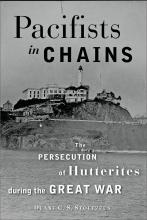conscience

A midpoint report from this month’s Synod of Bishops reveals that Catholic leaders are considering more conciliatory language toward gays and lesbians, divorced and remarried Catholics, and couples who live together before getting married.
Meeting with nearly 200 senior prelates and several dozen lay experts and observers at the Vatican, Pope Francis has deliberately engineered a lively discussion of issues concerning marriage and family life. This assembly, and a follow-up summit in 2015, will help shape the pontiff’s legacy.
Reporters and commentators are producing a flurry of analysis mostly centered on the question of whether the synod portends a change in substance or merely a change in tone. Such is the abiding question of Francis’ papacy.
Yet through these lively debates in Catholic life runs a theme that is as old as the Reformation: the role of individual conscience.

AS THE U.S. mobilized for World War I, a wave of patriotic fervor and xenophobia swept the country. Anything German was suspect, and those who were German-speaking and refused to fight against Germany were doubly suspect. Resentment and anger were directed at Anabaptist groups; several churches were burned and pastors beaten.
Inevitably, the demands of the state conflicted with the rights of conscience. Christian pacifists who only desired to be true to their beliefs by not serving in the military faced a militarized state that saw them as disloyal and disobedient. There was no legally recognized right to conscientious objection—if drafted, the only alternative for objectors was to go into the military and then refuse to participate.
Hutterite leaders had agreed that their young men would register, but if drafted and required to report for military service, their cooperation would end. They would refuse any orders making them complicit in war. Pacifists in Chains is the story of four young men—David, Michael, and Joseph Hofer, and Jacob Wipf—from the Hutterite colony in Alexandria, S.D., who faced that choice. Duane C.S. Stoltzfus, a professor at Goshen College in Indiana, was given access to previously unpublished letters from these men to their wives and families; the book is built around those letters.
Upon being drafted, the four reported in May 1918 and were sent to Fort Lewis, Wash. When they arrived, they immediately faced the test. Ordered to sign an “enlistment and assignment card” and line up as soldiers, they refused and were taken to the guardhouse. Following a brief court-martial, they were found guilty and sentenced to 20 years. Two weeks later, they were in chains and with armed guards on a train headed south to Alcatraz prison in the San Francisco Bay, then a military “disciplinary barracks.” Once there, they again refused to put on the uniform—in this case a military prison one—and were placed in solitary confinement in “the hole,” a basement dungeon. The cells seeped water and were infested with rats; the men were given bread and water to eat and subjected to beatings.

Five key Catholic bishops are opposing the newly authorized Violence Against Women Act for fear it will subvert traditional views of marriage and gender, and compromise the religious freedom of groups that aid victims of human trafficking.
The act, which was signed into law by President Obama on Thursday, is intended to protect women from domestic violence, sexual assault and human trafficking, and allows the federal government to spend money to treat victims and prosecute offenders.
That language disturbs several bishops who head key committees within the U.S. Conference of Catholic Bishops that deal with, among other issues, marriage, the laity, youth and religious liberty.But for the first time since the original act became law in 1994, it spells out that no person may be excluded from the law’s protections because of “sexual orientation” or “gender identity” — specifically covering lesbian, transgender and bisexual women.
EVEN IN AN age of ever-faster news cycles and shorter word counts, some journalists still find ways to dig deep into research and reporting to bring history to life and lift up voices that might otherwise be unheard. Here is an eclectic mix of nonfiction works on issues and people that matter.
Can those who commit violent crimes ever truly be rehabilitated? What happens to them once they’re out of prison? In Life After Murder: Five Men in Search of Redemption (PublicAffairs, 2012), Nancy Mullane follows her subjects from prison to welcome-home parties and beyond. While never minimizing the crimes her subjects have committed, she portrays their full, complicated humanity. Moving insights about the ongoing spiritual, emotional, and practical work of accepting responsibility for great wrongs and rebuilding a life after prison are framed by reporting on the convoluted, expensive prison and parole policies of California.
You might not expect gripping drama from a writer specializing in U.S. Supreme Court history, but that’s what Gilbert King’s Devil in the Grove: Thurgood Marshall, the Groveland Boys, and the Dawn of a New America (Harper, 2012) delivers. Long before he became a Supreme Court Justice, Thurgood Marshall was an NAACP lawyer who risked his life travelling to the Jim Crow South to defend African Americans accused of capital crimes. Devil in the Grove describes his efforts to save a black citrus picker from the electric chair in a Florida county where the Klan and law enforcement were brutally intertwined—and brings alive an era of domestic terrorism against people of color in the not-distant-enough past.

So, I kicked the hornets' nest with my recent piece in The Atlantic, "In Defense of Eating at Chick-fil-A." The comments were brutal, with most excoriating the chicken chain and rejecting my argument that boycotts such as this are a waste of time. I've received many emails about this, and a few issues have been raised that need addressing.
First, is the matter of Chick-fil-A's funding. Critics claim that they have donated millions of dollars to "hate groups." A report by Equality Matters serves as the basis, but a deeper look at the actual numbers tells a different story.
Yes, Chick-fil-A donated money to "pro-family" groups, but most of them — with the exception, perhaps, of the Family Research Council, which received a paltry $1,000 from the fast-food company in the year cited — don't deserve the derisive title.
Included in the list are organizations such as Fellowship of Christian Athletes. If you know anything about FCA, you'll agree that labeling them "anti-gay" is flat out dishonest. Regardless of your stance on gay marriage, I encourage you to investigate EM's report and do your homework on what the groups on this list actually stand for and work toward. You be the judge.
Underlying the question of funding is a fundamental distinction that too few Americans fail to recognize. Our society must begin to recognize that being "anti-gay marriage" is not the same as being "anti-gay." Chick-fil-A's top executives and perhaps the corporation as a whole might be classified under the first label but not the second.

Looking for a last-minute gift for Fathers Day or a graduate?
How about doing something for someone else in honor of your loved one?
Give a gift that helps the poorest of the poor feed their families, earn a living, protect themselves from disease or educate their children.
Inside the blog, find several suggestions of unique gifts that keep on giving.
Facing growing furor from religious groups, President Obama on Friday unveiled an "accommodation" in which health insurance companies, rather than religious institutions such as Catholic hospitals and universities, will provide employees with contraception coverage.
Houses of worship remain exempt, and the new approach effectively removes all faith-based organizations from involvement in providing contraceptive coverage or even telling employees how to find such coverage. It also maintains Obama's pledge to ensure that almost all women with health insurance will not have to pay for it.
At issue was a mandate, part of Obama's 2009 health-care overhaul, that employers provide free birth-control coverage. The mandate was announced Jan. 20 by Health & Human Services secretary Kathleen Sebelius. Religious groups, particularly Catholic, fiercly objected, saying the federal government should not force institutions to violate the tenets of their faith. Womens' advocates argued that employees should have access to birth control regardless of where they work.
The recent British film In Our Name is a returning-soldier drama featuring a married woman, Suzy, who leaves her husband and little girl to fight in Iraq. Because she's involved in the killing of a little girl during her tour-this part is based on a true story, but it happened to a man -- she returns home only to steadily fall apart under the stress of soul-destroying anxieties.
When I first visited Ethiopia at the height of the 1984 famine, I watched as twenty-four people died of starvation in less than fifteen minutes, right in front of my eyes. Barely five years into my career as a Congressman, nothing my staff told me beforehand could have prepared me for what I saw on that trip.
Gasping at awful photographs of unspeakable human suffering is one thing; bearing firsthand witness to human suffering is another thing entirely. Glancing at a picture of a starving child in the newspaper, you can always turn away, but when you're staring into the eyes of a mother who has just lost that child, it's a completely different story. There's no looking the other way.
That's why I often describe those first Ethiopia experiences as my "converting ground" on issues of global hunger. What happened in Ethiopia changed me, and changed how an entire generation looks at hunger.
It's also why I'm currently back on the Horn of Africa, reporting on the ground from the Dadaab refugee camp in eastern Kenya, less than fifty miles from the Somali border. And I am appealing to my affluent brothers and sisters in the United Stated and around the world not to look away. We need your help.
At the Wild Goose Festival in North Carolina last weekend, I was able to speak with Anna Clark, author of Green, American Style, president and founder of EarthPeople, a green consulting firm, and a contributor to Taking Flight: Reclaiming the Female Half of God's Image Through Advocacy and Renewal. Anna has a heart for equipping churches to make small and big changes for the sake of creation care and stewardship of the earth's resources. How can Christians do this, you ask? Read our conversation to find out.
On Easter weekend, I will break my fast. I will have spent almost four weeks drinking only liquids. But, as is often true of fasts, what has been gained is far greater than anything given up.
The extreme budget cuts proposed to critical programs that save the lives, dignity, and future of poor and vulnerable people have crossed the line.
With all the angst about the economy, the deficit, and a looming government shut-down, I'm still concerned that we're treating symptoms rather than diagnosing the underlying disease.
I know something about this. I spent a week in the hospital last year having loads of tests done -- blood work, heart scans, stress tests, and sonograms. I was discharged without a diagnosis, merely with hopes that by treating the symptoms, whatever was wrong would go away. It didn't. It turned out my real problem was a tick-born disease, and once it was diagnosed, a ten-dollar prescription of antibiotics cured me. Without that ten-dollar prescription to treat the real problem, I could have experienced life-long disability.